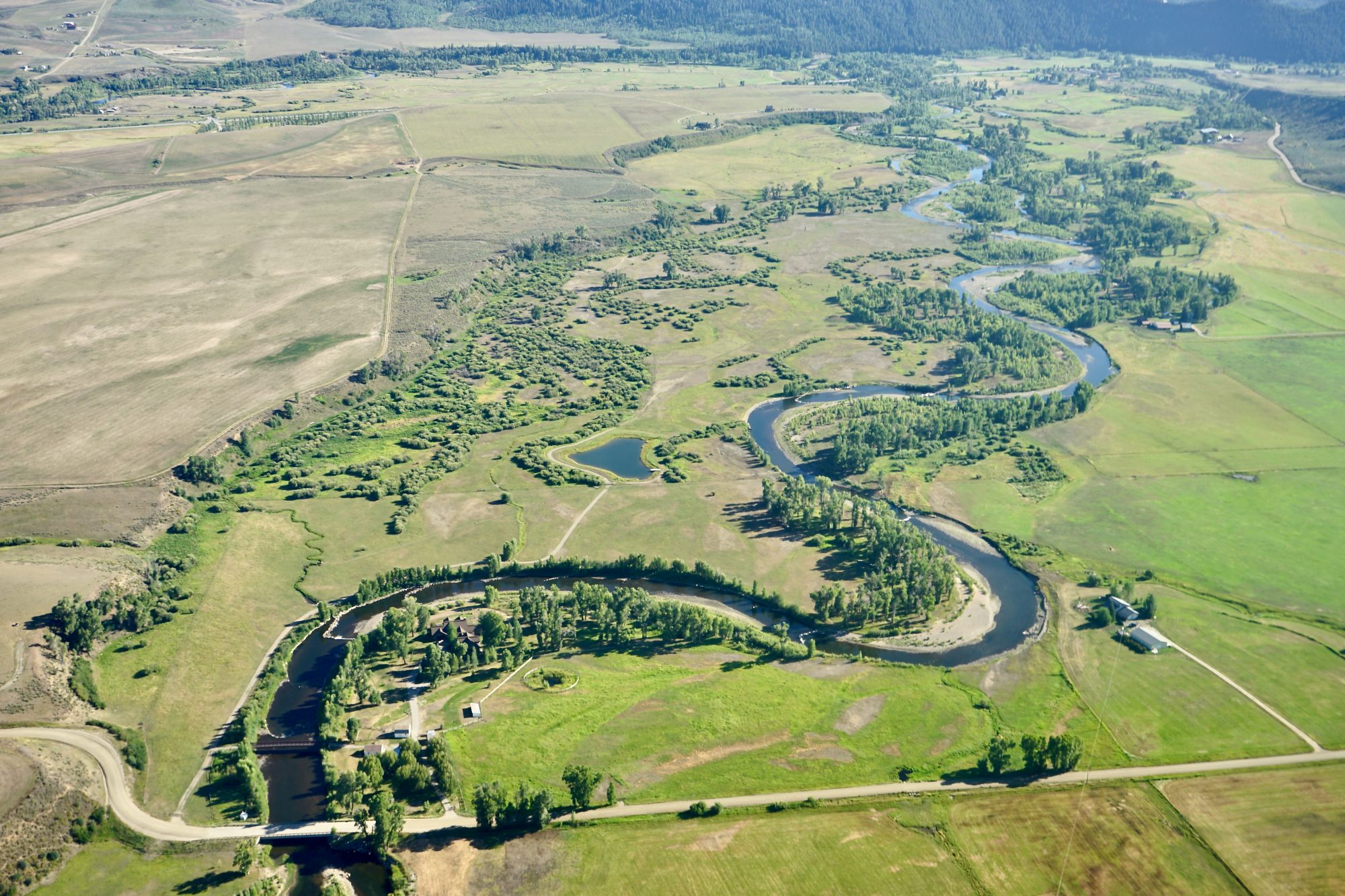On November 24, , the Colorado River Compact celebrates its 100th birthday. This 4-page document — signed in Santa Fe, N.M. by the seven states through which the Colorado River flows — became the foundational document governing management of America’s hardest working — and most endangered — river. The Compact was successful in its stated goal, jump-starting “the expeditious agricultural and industrial development” of the West, but a century after its signing, the Compact governs a Basin that is growing beyond recognition, and faces a far different reality than the framers dreamed.
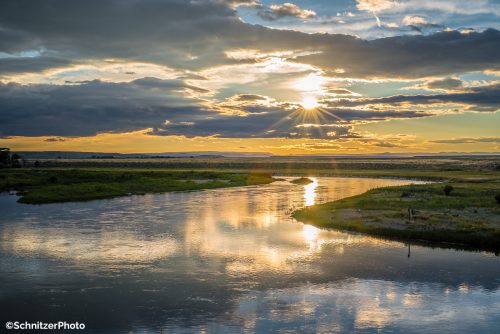
Upper Colorado River photo by Russ Schnitzer (@SchnitzerPhoto)
A hotter, drier reality grips the Basin due to drought, explosive growth, and climate change. Historic shortage declarations, dwindling flows, and threats of a hydropower crisis endanger the West daily. But the Compact had shortcomings from the start. It failed to involve Tribal Nations — long-term stewards of the land and river — as separate sovereigns with rights and interests on the River. It did not consider and incorporate environmental values in river management decisions. It overestimated the available river flows to be apportioned within the Basin. After 100 years, these limitations weaken the management system that teeters on the edge of a crisis in the face of drought accelerated by climate change across the fastest growing region of the country. The river simply cannot keep up. When the old way of doing things doesn’t work anymore and survival is threatened by seemingly insurmountable problems, the system can either crash, or people will come together to innovate solutions around a resource that literally supports everyone in the basin and across the country.
Crises provide an opportunity to do things we couldn’t anticipate or imagine. We have, lying before us, the potential to build a future that better fits the needs and values of today. It doesn’t require a renegotiation of the Compact, but does require adapting the original Compact’s application across the Basin to be relevant today. To succeed, we need to act now.
It’s often said that, in times of crisis, acceptance is the first step. We need to acknowledge that climate change has
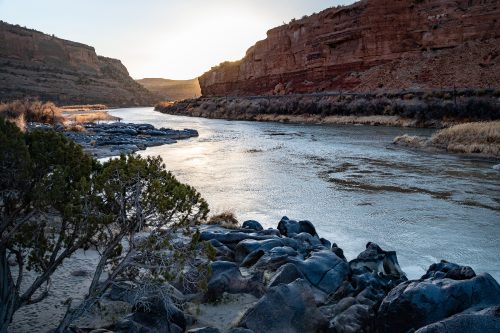
Ruby Horsethief, a stretch of the CO River in Western Colorado. ©Dawn Kish
thrown a wrench into our 100-year old river management framework, and that clinging to old ways as the Basin’s hydrology changes from one of abundance to one of scarcity, risks an uncertain future for communities, economies, and ecosystems throughout. Communities across the West are already facing these impacts daily, whether by the inability to safely access clean water, harming birds and wildlife, closing essential economic activities like river recreation due to dwindling flows, or drying up family farms that have been operating for generations.
Once we’ve acknowledged the current state of the crisis and how we got here , it’s essential that everyone accept responsibility as members of the Colorado River community, and adopt a water-wise ethic to do what it can to sustain the basin. No one water user, water sector, state, basin or government can independently achieve the changes needed to sustain a functioning river system. By recognizing that everyone has a role in the Basin community, we can work together to:
- update operations to do more than rely on practices implemented for the past 100 years;
- reduce and adapt water uses to fit within the river we have, not the one we imagined a century ago, or the one we just wish would return through by mere hope;
- respect that healthy watersheds, National Parks, and river systems are more than mere luxuries that can be overlooked or sacrificed.
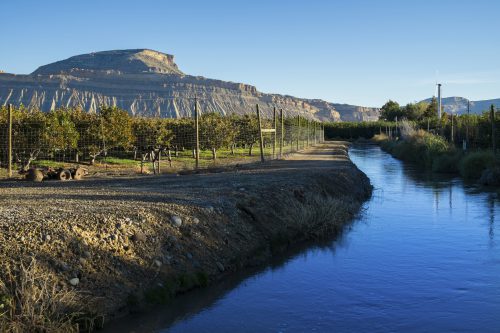
Irrigation water used for grapes and fruit groves in scenic landscape on sunny day. Palisade, Colorado USA.
The Colorado River community and everyone who depends upon it has a significant opportunity to do just that as it embarks on updating the operational guidelines for the river system. To address the crisis through this process, the community will need to: (1) be realistic about the available hydrology and river conditions going forward; (2) plan for possible worst case scenarios; and (3) create greater flexibilities and resiliencies within the system to help the basin adapt to existing and future conditions. To this end, we will need to be flexible, balanced and also transparent in the process. This includes involving all stakeholders — especially Tribes — in the process.
We are already seeing progress in some areas. Transformational federal funding is flowing to Western water in a way that’s never been seen before, with the recent appropriations provided through the Infrastructure Investment and Jobs Act, Inflation Reduction Act, Farm Bill, and other pieces of Federal legislation that promote resilience building throughout the Western United States.
But more needs to be done. It’s essential that Colorado and other Basin communities effectively capture and 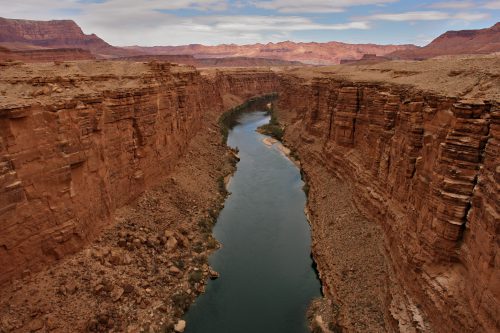 implement the available funding while maintaining pressure on elected officials to continue prioritizing funding for critical resilience strategies in the Basin. Moreover, we must recognize that the threat of litigation is not a good water management strategy. It puts the entire Colorado River community at risk by providing no meaningful clarity on how to efficiently adapt to actual conditions in the Basin, it hinders problem solving, stifles collaboration, and promotes an adversarial stance, rather than thoughtful, intentional, and honest collaboration.
implement the available funding while maintaining pressure on elected officials to continue prioritizing funding for critical resilience strategies in the Basin. Moreover, we must recognize that the threat of litigation is not a good water management strategy. It puts the entire Colorado River community at risk by providing no meaningful clarity on how to efficiently adapt to actual conditions in the Basin, it hinders problem solving, stifles collaboration, and promotes an adversarial stance, rather than thoughtful, intentional, and honest collaboration.
The signers of the Colorado River Compact recognized that the Colorado River is essential to life and critical to our ability to thrive in the West. A century later, they could not anticipate the values and conditions challenging the Basin today. Therefore it is incumbent upon us to pick up where the Compact negotiators left off and build on the framework they provided. The turbulence of our time will leave a legacy with long-term consequences. Unrelenting uncertainty can make us anxious and fearful, but it can also highlight and inspire our resilience, but only if we do it together.
